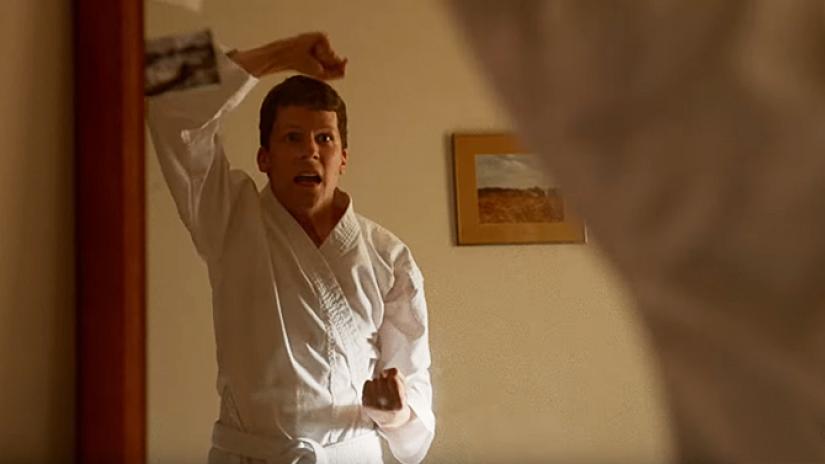
As the United States deals with yet more mass shootings, many people are struggling to understand what would drive a person to commit such atrocities. While white supremacist leanings is debated as the motivating ideology, there is also much discussion over the sociological causes of the increase in violence. What are young men, young white men specifically, experiencing to drive them to such violent displays of their frustration? One recently released film seeks to answer that question.
The Art of Self-Defense follows Casey (Jesse Eisenberg), a young man who lives alone and has trouble defending or standing up for himself in a world that sees his meek nature and slight build as signs of weakness. After being attacked on the street by a mysterious motorcycle gang, Casey explores self-defense options. After happening upon a karate dojo while walking down the street, he soon uncovers it and its sensei (Alessandro Nivola) have a sinister view on violence and masculinity.
The question at the center of The Art of Self-Defense is that of masculinity and the role it plays in shaping modern men. When we first meet Casey, we see a man of slight build, who lives alone, and is constantly belittled by the only people with whom he does have face-to-face contact with everyday, his stereotypically masculine “bro” co-workers who have effectively shut him out of their group. In fact, upon his return from the hospital after being attacked, the only person who appears to have even checked on him is his boss, who left a voicemail encouraging him to take time off. The male loneliness epidemic is something that I have written about before and something that cultural developments continue to insist our society takes more seriously. The film provides a good depiction of how isolation from others and the lack of affirmation that results from a lack of friendships and the resulting love and care are intertwined with young men following a path toward stereotypical displays of masculinity that too often include extreme violence. All humans have an innate desire to belong somewhere and to something and most satisfy that need. What they choose, whether it be something productive like a sports team or league, or something dark like anti-social groups looking to recruit the most vulnerable among us, depends on who can reach these people first and show them that they have a friend in them. Karate not only provides Casey with the self-defense and confidence he ached so much for, Sensei provided him with a welcoming person that believed in his potential, drawing him into the dojo permanently.
The Art of Self-Defense doesn’t just examine extreme masculinity in terms of how it affects its adherents, the film also uses the character Anna (Imogen Poots) to display how hyper-masculine views affect women and how they are treated in the workplace and society at large. Anna is the best student at the dojo as well as Sensei’s longest tenured student, yet she is prevented from ever promoted to the coveted level of black belt by Sensei due to his antiquated views on toughness and skill solely being the purview of men, which Anna could never achieve. The stilted, simple dialogue utilized in the scene revealing Sensei’s views are included not just for comedic effect, but to make plain the rigidity and stupidity behind the line of thinking that keeps the glass ceiling strong. The misogynistic views of Sensei serve to not only stunt Anna’s growth and development as a karate participant, but also put her in danger as we learn about her having to fend off an attack from a fellow student in the past, only to take blame for “tempting him” in the aftermath. Anna’s internalization of the views of her environment and mentor put into perspective how our society’s treatment of women causes many young women to internalize all that they must deal with in navigating the world around them. Like Casey, Anna too wanted to belong and be recognized for her immense skill. The more Sensei refused her the satisfaction, the more she sought to prove him and her male peers wrong, albeit to no avail. It was a vicious cycle of disappointment, sadness, anger, and self-doubt that will look sadly all too familiar for many in the audience.
The Art of Self-Defense is a lot like 1999’s Fight Club in terms of the theme it seeks to examine, but lacks the engaging leads of that film which really powered it to its lofty status, as well as the intricate, engaging plot with the infamous mind-blowing twist at the end. That sentence might normally be a bad one to have assigned to your film, but in the case of a dark comedy seeking to make a statement about our society and culture, it may be a boon for the movie in achieving its goal. Fight Club has gone on to become a favorite film for groups of young men that have taken the wrong message from what director David Fincher was trying to say. Indeed, Fincher once said during a Q&A that after his daughter informed him that a male friend declared Fight Club to be his favorite film, Fincher responded by telling her to never speak to him again. By lacking some of that film’s intoxicating charm, The Art of Self-Defense may ensure that it’s critique of the film’s subject matter comes across more clearly. Despite the strength of the film’s message, the overall product still falls a bit flat and feels ultimately forgettable. Usually strong performers like Jesse Eisenberg and Imogen Poots are simply decent here and the film does drag at times. The dark comedy is chuckle worthy throughout, and the film’s message is timely, but in terms of entertainment value, it’s simply serviceable.
Image: Bleeker Street

